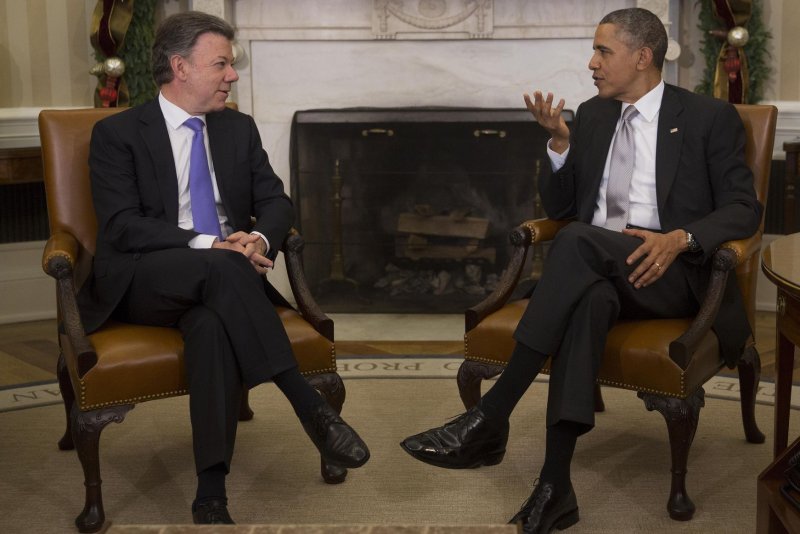1 of 3 | U.S. President Barack Obama, right, meets with Juan Manuel Santos, Colombia's president, in the Oval Office of the White House in Washington, D.C., December 3, 2013. Obama and Santos said the free trade accord that took effect last year has been a boon for both countries and that relations are at a high point. UPI/Andrew Harrer/Pool |
License Photo
WASHINGTON, Dec. 3 (UPI) -- "Tremendous progress" in improving security in Colombia has led to greater U.S.-Colombian cooperation overall, U.S. President Barack Obama said Tuesday.
"Not only do we continue to excel in security cooperation that has I think helped to facilitate the tremendous progress that's taken place in Colombia over the last decade," Obama said following a White House meeting with Colombian President Juan Manuel Santos, "but precisely because of the success on the security front, we've also been able to widen our discussion to a whole host of issues -- how we can improve education and economic opportunity in Colombia; how we can work together on energy projects that are vital to the region; how we can take advantage of new technologies to expand the ability for a rural child to be exposed to the world; and how we can work in partnership together on many of the key regional challenges that take place."
Santos said U.S.-Colombia relations are "at their best moment ever."
" And as a result, the agenda that we have discussed this morning is much broader than it's ever been," he said. "We have gone well beyond the usual items that we used to discuss, like security, like drug trafficking, and we are now expanding it to topics like education, energy, and mutual cooperation -- what we can do regionally."
The Oval Office meeting came as the two countries shift the primary focus of their ties from security concerns to economic matters, the White House said.
In a statement, the Obama administration said the visit "highlighted our cooperation" on free-trade, labor rights, energy and expanding opportunities for "vulnerable and disadvantaged groups," including "indigenous and Afro-descendant communities in Colombia and the United States."
"The United States reaffirmed its longstanding defense and security partnership with Colombia, and strongly supports Colombia's unwavering commitment to seeking a durable peace, including through the peace talks now under way, in order to permit Colombians the greater peace, security, and prosperity they deserve," the White House said in a release after the Oval Office meeting.
The two leaders also agreed to cooperate on "strengthening the rule of law and protection of human rights in Colombia" and the White House said the United States has agreed to provided more than $4 million in fiscal year 2013 to help remove land mines in Colombia.
Obama and Santos also discussed Colombia's efforts to join the Organization for Economic Cooperation and Development, an international organization that promotes economic cooperation among nations.
The meeting also produced agreements on educational, environmental and scientific matters.
Obama told reporters after the meeting there are still "some very challenging questions" on security but he said trade between the two countries has grown because of progress on security, and said trade has grown 20 percent under a recently instituted trade agreement.
"That creates jobs in Colombia; it creates jobs here in the United States of America," Obama said.
Ahead of the meeting, a senior administration official speaking on background said the trade agreement -- passed by the Colombian Congress in June 2007 and by the U.S. Congress in October 2011 -- will eliminate most tariffs and other barriers to trade in goods and services between the United States and Colombia.
It will also let Colombia join the World Trade Organization's Information Technology Agreement, which will remove Colombia's IT trade barriers.
The administration official said U.S. assistance was shifting toward an economic partnership because Colombian authorities have increased their country's security.
"The bottom line on this is that the security-assistance package was always designed to be phased out over time, based on how conditions were improving on the ground in Colombia," the official said, speaking on condition of anonymity.
"And, in fact, conditions have been improving on the ground, and so every year, year on year, the security-assistance package is most likely going to be declining over time," the official said.
The White House meeting took place amid peace talks between the Colombian government and the country's largest guerrilla group, the Revolutionary Armed Forces of Colombia, or FARC.
Santos said Monday in remarks at an event hosted by the University of Miami he was "cautiously optimistic" the talks in Havana would succeed, El Nuevo Herald reported.
The government and FARC have announced agreements on plans to reduce rural inequality and a framework for FARC to become a political party and run candidates in elections.
The agreements will go into effect only if a full, comprehensive peace deal is reached. The deal would end five decades of conflict.
The FARC Marxist-Leninist group, purporting to represent the rural poor in a struggle against Colombia's rich and powerful, has pursued an armed conflict in Colombia since 1964. It is financed primarily by kidnappings and drug trafficking.
Sporadic fighting still takes place, and the rebel fighters have yet to surrender their weapons, The New York Times reported.















